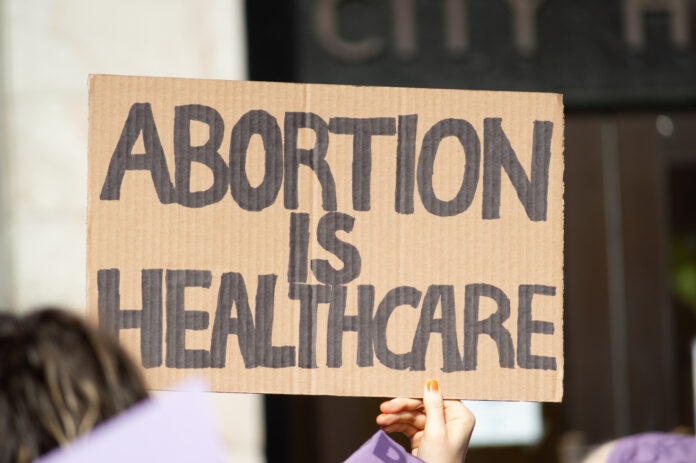On June 24 the U.S. Supreme Court overturned Roe v. Wade and Planned Parenthood v. Casey, nullifying the constitutional right to abortion and leaving it up to the states to determine its legality. The decision came as a result of the case Dobbs v. Jackson Women’s Health Organization, in which members of the organization challenged a Mississippi law that bans all abortions, with some acceptions, after 15 weeks of pregnancy. While abortion access is still legal in Pennsylvania, seven states have banned abortions, with seventeen more expected to do so in the coming weeks.
PGN reached out to LGBTQ+ leaders and community members to share their thoughts on how the Supreme Court decision will impact queer, trans and gender expansive communities, people of color, and intersections.
“I think this is histrionic of what we’ve been experiencing as minorities, as people who are most vulnerable to these sorts of decisions,” said trans activists Kendall Stephens. “These kinds of political decisions impact communities of color and minority communities and disenfranchised communities more than any other. We’re going to see the repercussions of this play out in our urban communities of color in a very devastating way.”
Stephens pointed out that the discourse around abortion rights does not include people who are gender expansive, including trans, nonbinary and gender nonconforming people. “When you see an issue like this that is seen from a cis/het lense primarily, that leaves out all of the other minorities who are also suffering as a result of this.”
“As a Black, queer woman who has benefited from having access to abortion services, the decision to overturn Roe v. Wade is unimaginable and disheartening,” Nhakia Outland, founder and president of the social justice organization Prevention Meets Fashion, said in an email. “This decision will have an effect on all genders and identities especially those that sit at the intersection of Black, Brown, LGBTQ and nonbinary identities. These communities already have a deep-seated mistrust in the system due to discrimination, access issues and mistreatment.”
Outland also called attention to the fact that the issue of abortion access does not just affect cisgender women. “We have to remember that this is not just a ‘women’s issue’ and framing it as such invalidates LGBTQ+ and non-binary folx who can get pregnant, have children, seek abortions, seek birth control and other reproductive health services.”
Sultan Shakir, president and executive officer of Mazzoni Center, echoed the thoughts of fellow community leaders, that abortion regulations will disproportionately impact communities that don’t readily have access to healthcare. “Like many issues, the impact will disproportionately fall on individuals who don’t have the resources to navigate what will become a more complex process to access care,” Shakir said in an email.
Conservative Supreme Court Justices Samuel Alito, Amy Coney Barrett, Neil Gorsuch, Brett Kavanaugh, John Roberts and Clarence Thomas voted in favor of the decision to overturn Roe. Liberal Justices Stephen Breyer, Elana Kagan and Sonia Sotomayor dissented.
In his opinion, Justice Thomas said that the reversal of Roe v. Wade would set legal precedents to overturn other federal civil rights cases, including Obergefell v. Hodges, which prohibits state governments from banning same-sex marriage; Lawrence v. Texas, which deemed the criminalization of same-sex intimacy unconstitutional; and Griswold v. Connecticut, which ruled that married couples can use contraception if they so desire.
Texas Attorney General Ken Paxton recently said that he would defend that state’s sodomy law if the Supreme Court choses to revisit Lawrence v. Texas. The news from both the Supreme Court and from Paxton put a potential reversal of rights into sharp focus and is causing LGBTQ organizations to worry what might come next.
“The Supreme Court authorized states across the country to strip millions of Americans of the right to control their bodies and make their own critical healthcare decisions,” the Philadelphia LGBTQ Bar Association collectively said in a press release. “In finding that the right to abortion is not ‘deeply rooted’ in the history of the United States, the Supreme Court continues down a path fraught with dangers that risk the security of many other fundamental rights held by Americans. We agree with the dissenting Justices Breyer, Sotomayor and Kagan, who presciently write that ‘we cannot understand how anyone can be confident that today’s opinion will be the last of its kind.’”
Sappho Reynan Fulton, a coaching psychologist who does LGBTQ advocacy work with a focus on ending domestic violence, underscored the connection between the reversal of the landmark abortion rights case and the potential revocation of rights that affect LGBTQ and people of color.
“We are terrified in the LGBTQ community in this moment,” Fulton said. “Because we know coming down the pipe it is an extended event of racial separation; Black folks are definitely in the equation. This is a 14th Amendment issue, Roe v. Wade. So many of us took it for granted. If they go after the LGBTQ community at large, they’re going to go after gender affirming care, they’re going to go after our healthcare, they’re going to go after our marriage equality rights. There are so many things that this entails.”
Although Gov. Wolf has vetoed multiple bills restricting abortion rights in Pennsylvania, the fate of abortion legislation lies in the gubernatorial elections this fall. While Democratic candidate Josh Shapiro supports the right to choose, ultraconservative Republican Doug Mastriano is emphatically against abortion rights, even in cases of rape and incest.
“The stakes for our communities across Pennsylvania are too high to not vote this November,” Liberty City LGBT Democratic Club collectively said in a statement. “Liberty City and its membership will continue supporting only pro-choice candidates for public office and we will fight like hell to ensure the Governor’s office is held by a Democrat come 2023 to maintain a veto over anti-choice Republicans.”

